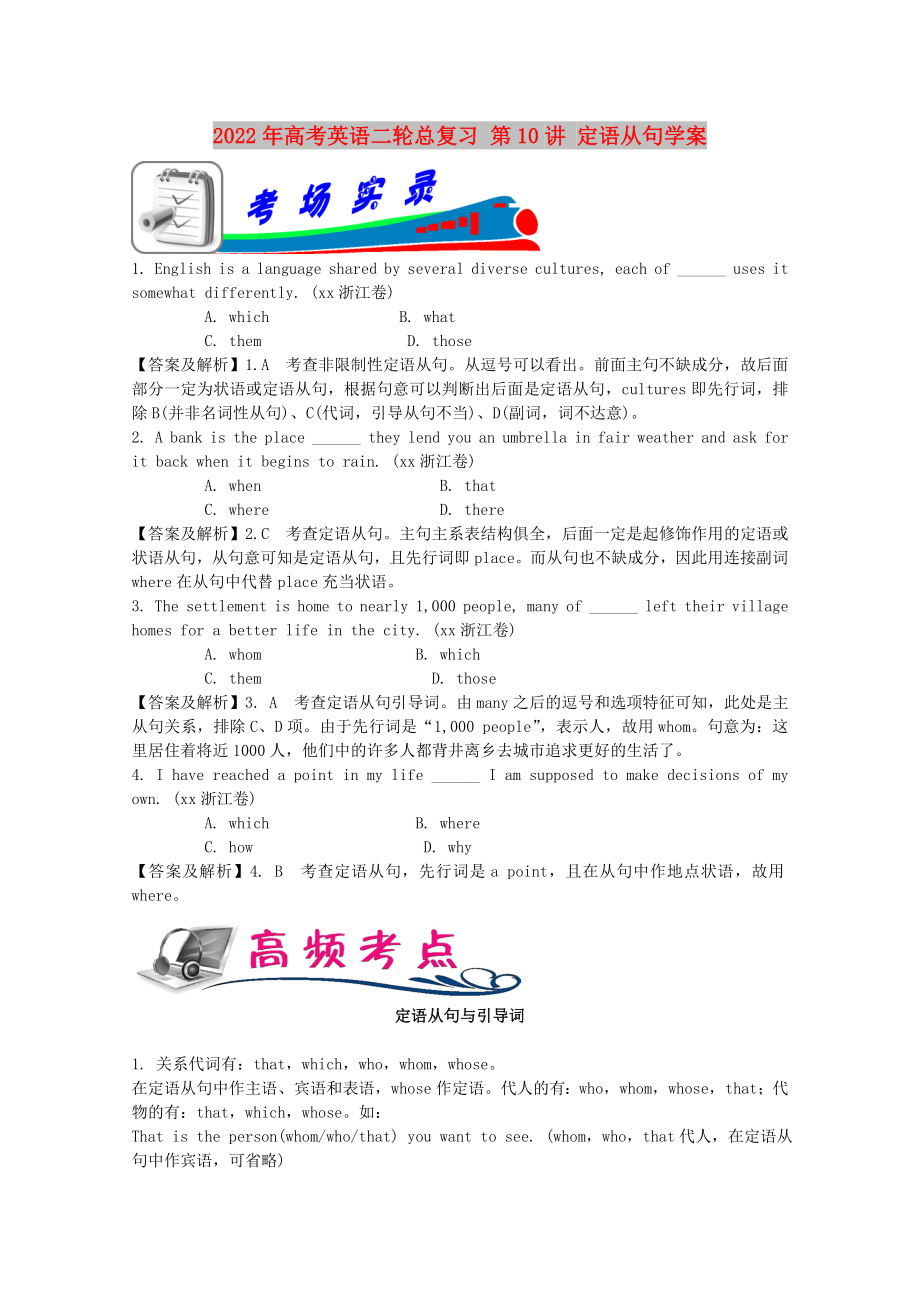《2022年高考英語(yǔ)二輪總復(fù)習(xí) 第10講 定語(yǔ)從句學(xué)案》由會(huì)員分享,可在線(xiàn)閱讀�,更多相關(guān)《2022年高考英語(yǔ)二輪總復(fù)習(xí) 第10講 定語(yǔ)從句學(xué)案(3頁(yè)珍藏版)》請(qǐng)?jiān)谘b配圖網(wǎng)上搜索。
1�、2022年高考英語(yǔ)二輪總復(fù)習(xí) 第10講 定語(yǔ)從句學(xué)案
1. English is a language shared by several diverse cultures, each of ______ uses it somewhat differently. (xx浙江卷)
A. which B. what
C. them D. those
【答案及解析】1. A 考查非限制性定語(yǔ)從句。從逗號(hào)可以看出�。前面主句不缺成分����,故后面部分一定為狀語(yǔ)或定語(yǔ)從句,根據(jù)句意可以判斷出后面
2��、是定語(yǔ)從句�,cultures即先行詞��,排除B(并非名詞性從句)���、C(代詞,引導(dǎo)從句不當(dāng))����、D(副詞,詞不達(dá)意)���。
2. A bank is the place ______ they lend you an umbrella in fair weather and ask for it back when it begins to rain. (xx浙江卷)
A. when B. that
C. where D. there
【答案及解析】2. C 考查定語(yǔ)從句��。主句
3、主系表結(jié)構(gòu)俱全����,后面一定是起修飾作用的定語(yǔ)或狀語(yǔ)從句�,從句意可知是定語(yǔ)從句,且先行詞即place��。而從句也不缺成分,因此用連接副詞where在從句中代替place充當(dāng)狀語(yǔ)。
3. The settlement is home to nearly 1,000 people, many of ______ left their village homes for a better life in the city. (xx浙江卷)
A. whom B. which
C. them
4����、D. those
【答案及解析】3. A 考查定語(yǔ)從句引導(dǎo)詞。由many之后的逗號(hào)和選項(xiàng)特征可知�,此處是主從句關(guān)系,排除C���、D項(xiàng)。由于先行詞是“1,000 people”,表示人�����,故用whom��。句意為:這里居住著將近1000人,他們中的許多人都背井離鄉(xiāng)去城市追求更好的生活了。
4. I have reached a point in my life ______ I am supposed to make decisions of my own. (xx浙江卷)
A. which B. where
C. how
5�、 D. why
【答案及解析】4. B 考查定語(yǔ)從句,先行詞是a point����,且在從句中作地點(diǎn)狀語(yǔ),故用where�。
定語(yǔ)從句與引導(dǎo)詞
1. 關(guān)系代詞有:that����,which�,who��,whom���,whose��。
在定語(yǔ)從句中作主語(yǔ)、賓語(yǔ)和表語(yǔ)���,whose作定語(yǔ)�����。代人的有:who,whom,whose�����,that��;代物的有:that,which�,whose�。如:
That is the person(whom/who/that) you want to see. (whom��,who�,that代人,在定語(yǔ)從句中作賓語(yǔ),可省略)
A diction
6�、ary is a useful book which(=that) tells us the meaning of words. (which或that代物,在定語(yǔ)從句中作主語(yǔ))
2. 關(guān)系副詞有:when(指時(shí)間)����,where(指地點(diǎn))�����,why(指原因)���,在定語(yǔ)從句中作狀語(yǔ)。如:
Would you suggest a time(when) we can have a talk�����?(when可省略)
The house where they live is not very large.
This is the reason why he did not e to the meeti
7���、ng.
注意:不是所有表時(shí)間的先行詞都用when引導(dǎo)定語(yǔ)從句�,不是所有表地點(diǎn)的先行詞都用where引導(dǎo)定語(yǔ)從句。如:
We'll visit the factory which(=that) makes radios.
(which或that在定語(yǔ)從句中作主語(yǔ)����,where不可作主語(yǔ),故不可用�����。)
They still remember the happy days(which/that) they spent in Beidaihe.
(which或that在定語(yǔ)從句中作spent的賓語(yǔ),when不可作賓語(yǔ)����,故不可用。)
限制性定語(yǔ)從句與非限制性定語(yǔ)從句
1. 限制性定語(yǔ)
8、從句和主句之間不用逗號(hào)分開(kāi),修飾主句中的某一個(gè)名詞或名詞詞組或代詞��;
2. 非限制性定語(yǔ)從句常用逗號(hào)和主句隔開(kāi)���,可以修飾主句中的某一個(gè)詞���,也可修飾整個(gè)句子��。
3. 非限制性定語(yǔ)從句不能用that引導(dǎo),引導(dǎo)非限制性定語(yǔ)從句的關(guān)系詞不能省略��。
Li Ping's father, who_works_in_a_factory,_is an engineer.
He tore up my photo, which_made_me_very_angry. (which指代主句內(nèi)容����,指他撕毀我照片這件事。)
He is good at physics, as is known to us al
9���、l. (as指代主句內(nèi)容��,指他物理很好這件事�����。)
which與as 引導(dǎo)非限制性定語(yǔ)從句的區(qū)別
1. which可以引導(dǎo)非限制性定語(yǔ)從句����,指代前面主句中講到的整件事�����。引導(dǎo)的從句不能放在句首��。
She didn't e yesterday, which made me very angry.
2. as也可以引導(dǎo)非限制性定語(yǔ)從句��,來(lái)指代整件事��,引導(dǎo)的從句可放在句首也可放在句中�,有“正如”的意思。
As is known to all, Taiwan is part of China.
He came in time, as we expected.
注意:在as is k
10���、nown to all, as we all know��,as is expected, as is mentioned above, as it is這類(lèi)結(jié)構(gòu)中as不可換為which。
which與as 引導(dǎo)非限制性定語(yǔ)從句的區(qū)別
只用that引導(dǎo)和不用that引導(dǎo)的場(chǎng)合
1. 只用that引導(dǎo)的場(chǎng)合
(1)當(dāng)先行詞既包括人又包括物時(shí):
He talked about the_men_and_the_books that attracted him.
(2)指物的先行詞被any, every, only, very, all, no等修飾時(shí):
These are the ve
11�、ry points that interest me.
(3)指物的先行詞被序數(shù)詞或形容詞最高級(jí)修飾時(shí):
The first_ step that we are to take is very difficult.
(4)先行詞是指物的不定代詞all,little,few����,much及everything�����,anything���,nothing等時(shí):
There is still much that can be done about it.
(5)先行詞是who時(shí):
Who that have seen him does not like him?
(6)為了避免重復(fù)時(shí):
T
12�����、hey secretly built up a small factory which produced things that could cause pollution.
(7)先行詞在句中作表語(yǔ)而且關(guān)系代詞在定語(yǔ)從句中也作表語(yǔ)時(shí):
Shanghai is not the city that it used to be.
易錯(cuò)易混點(diǎn)
1. “介詞+關(guān)系代詞”用法
(1)介詞的確定應(yīng)依據(jù)定語(yǔ)從句中短語(yǔ)的習(xí)慣性搭配,如:
Who is the girl with whom you just shook_hands���?(shake hands w
13��、ith…是習(xí)慣性搭配)
(2)介詞常受先行詞的制約(即介詞和先行詞的搭配)�����,如:
He built a telescope through which he could study the skies. (through which 即study through the telescope)
(3)當(dāng)關(guān)系代詞作“動(dòng)詞+介詞”固定短語(yǔ)的賓語(yǔ)時(shí)���,此時(shí)固定短語(yǔ)中的介詞不能拆開(kāi)移到關(guān)系代詞前�����。如:
This is the watch which you're looking_for.
He is a kind of man whom yo
14���、u can safely depend_on.
2. 幾個(gè)名詞后的引導(dǎo)詞
(1) situation, stage, case, point���,occasion等要注意具體情況具體分析���,作主語(yǔ)���、賓語(yǔ)�����、表語(yǔ)用that/which��;作狀語(yǔ)用where/when/介詞+ which���。
Can you imagine a situation where/in_which you can use the word?(狀語(yǔ))
There is one point that I must insist on. (賓語(yǔ))
(2) way(方式���,方法)后常用in which或that或how引導(dǎo)定語(yǔ)從句,也可省略����。
Do you know the_way (in which/that/how) he worked out the problem?
(3)“the same+名詞”��,“such+名詞”,“as+名詞”后通常用as引導(dǎo)定語(yǔ)從句����。
I have the same dictionary as you (have).
Such a book as you bought is not worth buying.
 2022年高考英語(yǔ)二輪總復(fù)習(xí) 第10講 定語(yǔ)從句學(xué)案
2022年高考英語(yǔ)二輪總復(fù)習(xí) 第10講 定語(yǔ)從句學(xué)案

